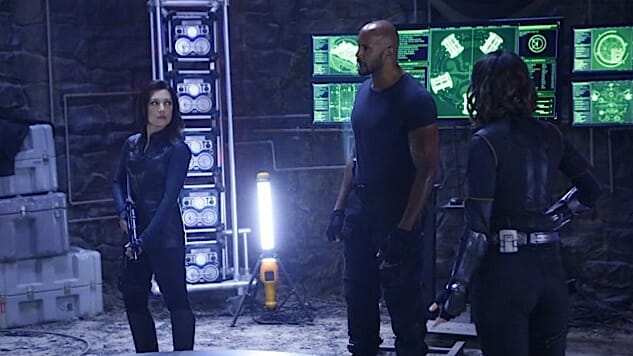Agents of S.H.I.E.L.D.: “Maveth”
(Episode 3.10)

“This is how S.H.I.E.L.D. works. You make a plan, the plan turns to rubbish, you make a new plan.” And in that one statement Hunter confirms all my suspicions that S.H.I.E.L.D. is completely aware that they are not performing at the top of their game. That doesn’t mean it doesn’t work out pretty consistently. The age of S.H.I.E.L.D. as a top level covert intelligence agency is almost certainly gone. Welcome to the new Wild West, where a ragtag team of do gooders fight against the unseen evil, hell-bent on taking over our lives. If that scenario sounds vaguely familiar it’s because the same sum up can be made of most every Whedon-influenced show ever created. And it’s not the only way that the Whedon hand can be felt.
Beyond being awesomely quotable, last night’s episode makes it clear that Agents of S.H.I.E.L.D., much like other Whedon-helmed shows, is beginning the process of reaching out into a kind of Lovecraftian cosmic horror. That’s not to say this is a bad fit. It’s a pretty natural progression, and while it still seems like an easy out to, once again, lay blame on Hydra, I can’t fault the show for trying to ask some bigger questions. It’s actually where Agents excels. The clandestine cloak and dagger of a spy show, or the grey zone morality of most law and order dramas never seems to settle well on this production team’s shoulders. While from time to time we get a stand-out episode with regards to these, the reason that Season Three is much stronger than the seasons that preceded it is that this season marks a departure from trying to put those topics we expect at center. I expect a spy show to be about top-secret operations, tough choices, and emotional fall out, but Agents does it’s best work when it’s not trying to be a spy show. Or a superhero show for that matter. So what kind of show is Agents of S.H.I.E.L.D. meant to be?
The honest, though perhaps overly simple answer, is horror. Yes, horror. Not science fiction, though there are certainly elements of that, but genuine out right horror. More and more Agents of S.H.I.E.L.D. is asking the question: what makes someone human? What forced inside and outside ourselves should we worry about taking away this humanity? And that’s what horror really is. It’s anything that asks us about our primal fears. Maybe asking these questions doesn’t make us want to close our eyes or scream in terror, but it does do what the most effective horror pieces do: make you wonder and leave you with a sense of unease that stays planted at the back of your mind for days, sometimes weeks after the fact, all by asking you a seemingly straight forward question.
That’s certainly what happened last night with Will, and while part of me mourns the Will and Fitz rendition of Pretty In Pink that will never be, seeing the exposed bone in Will’s leg after thinking that he and Fitz may just make it out alive hits more than a few horror buttons.
-

-

-

-

-

-

-

-

-

-

-

-

-

-

-

-

-

-

-

-

-

-

-

-

-

-

-

-

-

-

-

-

-

-

-

-

-

-

-

-








































